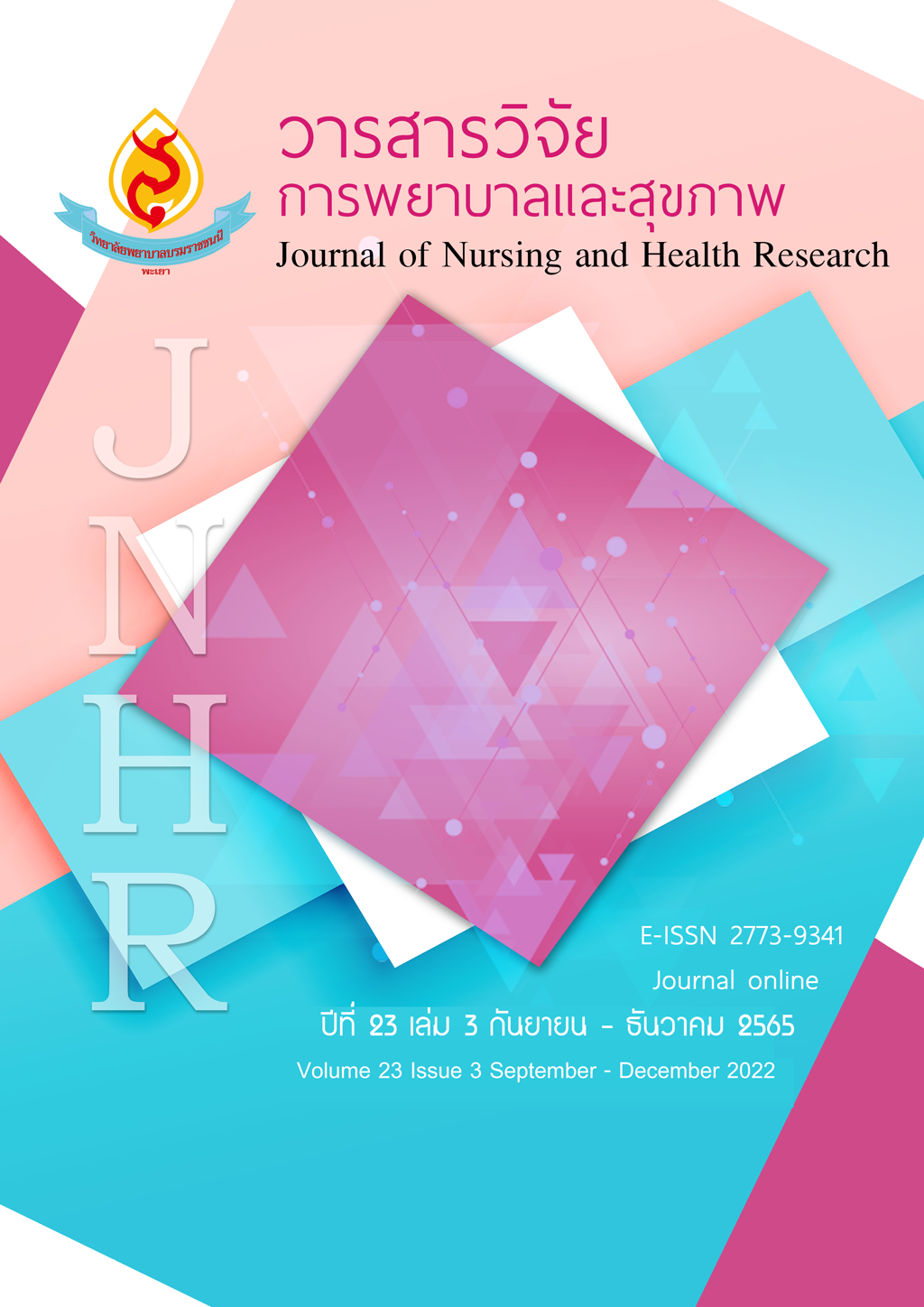มุมมองของนักศึกษาพยาบาลต่อการดูแลผู้ป่วยสูงอายุระยะท้ายสุดแบบประคับประคอง
คำสำคัญ:
นักศึกษาพยาบาล, ผู้สูงอายุ, ระยะสุดท้าย, การดูแลแบบประคับประคองบทคัดย่อ
การดูแลผู้สูงอายุที่เข้าสู่วาระสุดท้ายของชีวิตระยะสุดท้ายควรได้รับการดูแลอย่างเป็นองค์รวม เพื่อให้การจากไปอย่างสงบและสมศักดิ์ศรีของความเป็นมนุษย์ การวิจัยเชิงคุณภาพ มีวัตถุประสงค์เพื่ออธิบายมุมมองของนักศึกษาพยาบาลต่อการดูแลผู้ป่วยสูงอายุที่มีภาวะเจ็บป่วยในระยะสุดท้ายแบบประคับประคอง เลือกกลุ่มตัวอย่างแบบเฉพาะเจาะจงคือ นักศึกษาพยาบาลจากวิทยาลัยพยาบาลบรมราชชนนี พะเยา ที่ผ่านการฝึกภาคปฏิบัติวิชาปฏิบัติการพยาบาลบุคคลที่มีปัญหาสุขภาพ 3 ที่ดูแลผู้ป่วยสูงอายุระยะสุดท้าย หลังสิ้นสุดจากการฝึกปฏิบัติเป็นระยะเวลา 2 สัปดาห์ จำนวน 15 ราย เครื่องมือที่ใช้ในการเก็บรวบรวม ประกอบด้วย ผู้วิจัย แบบบันทึกข้อมูลส่วนบุคคล แบบสัมภาษณ์กึ่งโครงสร้าง แบบบันทึกภาคสนาม แบบบันทึกการสะท้อนคิด เครื่องบันทึกเสียง เก็บข้อมูลด้วยการสัมภาษณ์แบบเจาะลึก ข้อมูลจากการสัมภาษณ์นำมาถอดความแบบคำต่อคำ วิเคราะห์ข้อมูลโดยใช้วิธีการวิเคราะห์เนื้อหา และการสร้างความน่าเชื่อถือของข้อมูลตามแนวทางของลินคอล์นและกูบา ผลการศึกษา พบว่า มุมมองของนักศึกษาพยาบาลต่อการดูแลผู้ป่วยสูงอายุระยะสุดท้ายแบบประคับประคอง แบ่งเป็น 4 ประเด็น ได้แก่ 1. เกิดความรู้สึกเสียใจและความรู้สึกด้านลบต่อการเสียชีวิตของบุคคลในครอบครัว 2. การให้ความหมายการดูแลแบบประคับประคอง แบ่งเป็น 2 ประเด็นย่อย ได้แก่ 2.1 การดูแลผู้ป่วยให้จากไปอย่างสงบ และ 2.2 การดูแลให้ผู้ป่วยมีความสุขสบายมากที่สุดโดยใช้การดูแลด้วยหัวใจความเป็นมนุษย์ 3. ลักษณะการดูแลผู้สูงอายุระยะสุดท้ายของชีวิตแบบประคับประคอง แบ่งเป็น 3 ประเด็นย่อย ได้แก่ 3.1 การดูแลด้านร่างกาย 3.2 การดูแลด้านจิตใจ และ 3.3 การดูแลสภาพจิตใจครอบครัวผู้ป่วยสูงอายุระยะสุดท้าย และ 4. การเรียนรู้จากการดูแลผู้สูงอายุระยะสุดท้าย แบ่งเป็น 2 ประเด็นย่อย ได้แก่ 4.1 ความภูมิใจในตนเองกับการนำความรู้และทักษะการพยาบาลไปใช้ดูแลผู้ป่วย และ 4.2 ความสำคัญของการดูแลด้วยหัวใจความเป็นมนุษย์ ผลการศึกษาสามารถนำมาเป็นข้อมูลพื้นฐานในการพัฒนารูปแบบการจัดการศึกษาพยาบาลด้านการดูแลผู้ป่วยสูงอายุแบบประคับประคองที่สอดคล้องกับบริบท ประสบการณ์ ความเชื่อ มุมมอง ของผู้เรียน เพื่อนำไปสู่การดูแลผู้ป่วยสูงอายุระยะสุดท้ายอย่างมีคุณภาพ
เอกสารอ้างอิง
จอนผะจง เพ็งจาด. (2557). บทบาทพยาบาลในการดูแลแบบประคับประคอง. วารสารวิทยาลัยพยาบาลบรมราชชนนี กรุงเทพ, 30(1), 100–109.
ชุติกาญจน์ หฤทัย, อัมราภัสร์ อรรถชัยวัจน์ และโศภิษฐ์ สุวรรณเกษาวงษ์ (บก.). (2559). ระบบบริการพยาบาลแบบประคับประคอง. นนทบุรี: สำนักการพยาบาล สำนักงานปลัดกระทรวง กระทรวงสาธารณสุข.
ถนอมขวัญ ทวีบูรณ์. (2557). การดูแลผู้ป่วยระยะสุดท้าย.สืบค้นเมื่อ 7 กรกฎาคม 2562 จาก http://www.elearning.ns.mahidol.ac.th/Patients-with-end-stage/index.html
ปฐมพร ศิรประภาศิริ และเดือนเพ็ญ ห่อรัตนาเรือง (บก.). (2563). คู่มือการดูแลผู้ป่วยแบบประคับประคองและระยะท้าย(สำหรับบุคลากรทางการแพทย์). นนทบุรี: กรมการแพทย์ กระทรวงสาธารณสุข.
ปราณี อ่อนศรี. (2557). บทบาทของพยาบาลกับการดูแลผู้ป่วยระยะสุดท้ายตามความเชื่อทางศาสนา. วารสารพยาบาลทหารบก.15(2), 39-43.
พรทวี ยอดมงคล. (2561). การดูแลผู้ป่วยระยะท้ายแบบประคับประคอง (Palliative Care) ฉบับปรับปรุง. นนทบุรี: สำนักงานคณะกรรมการสุขภาพแห่งชาติ (สช.)
พวงพยอม จุลพันธ์, พรพรรณ มนสัจจกุล, และสุพรรณี สุดสา. (2563). ประสบการณ์ของญาติต่อการดูแลผู้ป่วยสูงอายุระยะสุดท้ายให้เผชิญการตายอย่างสงบ. วารสารวิจัยสุขภาพและการพยาบาล, 36(3), 33-44.
มูลนิธิสถาบันวิจัยและพัฒนาผู้สูงอายุไทย. (2564). สถานการณ์ผู้สูงอายุไทย พ.ศ. 2564. นครปฐม: สถาบันวิจัยประชากรและสังคม มหาวิทยาลัยมหิดล
มูลนิธิสถาบันวิจัยและพัฒนาผู้สูงอายุไทย. (2565). สถานการณ์ผู้สูงอายุไทย พ.ศ. 2564. นครปฐม: สถาบันวิจัยประชากรและสังคม มหาวิทยาลัยมหิดล.
ศรินรัตน์ วัฒนธรนันท์. (2560). ความโศกเศร้าจากการสูญเสียบุคคลอันเป็นที่รัก: บทบาทพยาบาล. วารสารพยาบาลสภากาชาดไทย, 10(1), 13-21.
ศิริรัตน์ ปานอุทัย. (2563). การพยาบาลแบบประคับประคองในผู้สูงอายุ. พยาบาลสาร, 47(1), 454 – 466.
สังวรณ์ สมบัติใหม่, พระครูสาทรธรรมสิทธิ์, และสุริยนต์ สูงคำ. (2563). การประยุกต์ใช้หลักพุทธธรรมเพื่อเยียวยาผู้ป่วยระยะสุดท้าย. วารสารพุทธศาสตร์ศึกษา, 11(1), 66-80.
Martin, A. M., Connor-Fenelon, M. O., & Lyons, R. (2012). Non-verbal communication between Registered Nurses Intellectual Disability and people with an intellectual disability: An exploratory study of the nurse’s experiences. Part 1. Journal of Intellectual Disabilities, 16(1), 61–75. https://doi.org/10.1177/1744629512440938
Stahl, N. A. & King, J. R. (2020). Expanding approaches for research: understanding and using trustworthiness in qualitative research. Journal of Development Education, 44(1), 26-28. https://eric. ed.gov/?id=EJ1320570
ดาวน์โหลด
เผยแพร่แล้ว
รูปแบบการอ้างอิง
ฉบับ
ประเภทบทความ
สัญญาอนุญาต
ลิขสิทธิ์ (c) 2022 วารสารวิจัยการพยาบาลและสุขภาพ

อนุญาตภายใต้เงื่อนไข Creative Commons Attribution-NonCommercial-NoDerivatives 4.0 International License.



